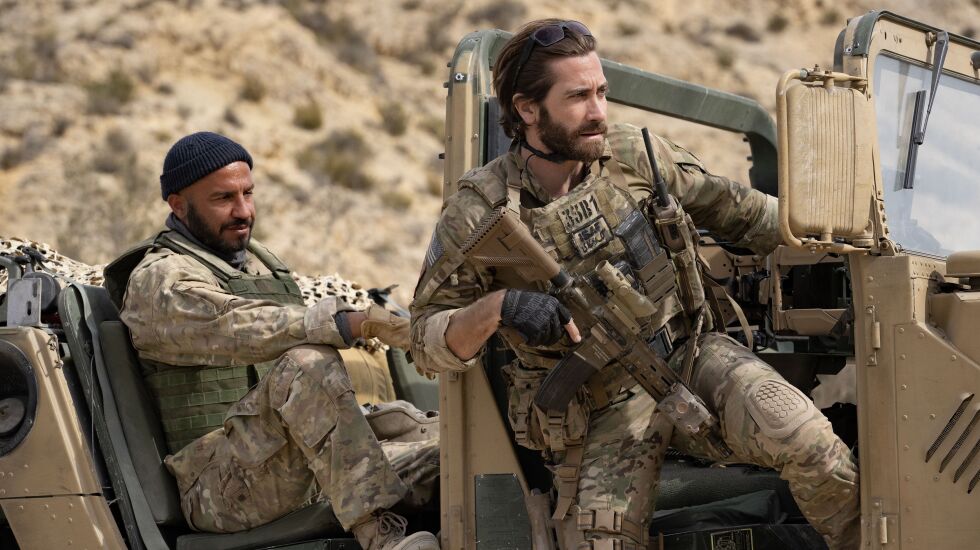
Guy Ritchie has famously carved out a brand name for himself through his quick-cut, action-packed, stylistically flamboyant, visually popping action work, from “Lock, Stock and Two Smoking Barrels” through “Snatch” and the “Sherlock Holmes” movies and “The Gentlemen.” Even if you didn’t see Ritchie’s name in the typically attention-getting opening credits, there’s a solid chance you’d know you were seeing a Guy Ritchie film.
Only now, though, has Ritchie literally put his name in the title of a movie—and one can’t help but wonder if he did so because “Guy Ritchie’s The Covenant” is such a departure from the norm, with the director leaving many of the tools in his trick bag untouched in favor of a relatively traditional and admirably staged war film that features some of the most impressively staged extended battle sequences in recent memory, with moments so intense you’ll have to remember to breathe.
It’s almost as if Ritchie wants to make sure we know he directed this, because it doesn’t seem like “a Guy Ritchie film.” Duly noted, and kudos to the veteran filmmaker for delivering a skillfully made and gripping tale about the hell of modern war and the universal nature of sacrifice, commitment and heroism.
Inspired by real-life recent history but not based on any specific true story, “The Covenant” shines a spotlight on the mostly forgotten and unsung Afghan allies of American troops who served the U.S. mission as interpreters for our soldiers and were promised visas for themselves and their families—if they survived.
Nearly two decades after Jake Gyllenhaal delivered a resonant performance as a U.S. Marine sniper deployed to the Gulf War in “Jarhead,” he’s hitting different acting notes but equally as effective here as Sgt. John Kinley, a world-weary, battle-tested but still passionate leader of a small squad tasked with finding IEDs, aka Improvised Explosive Devices. (Ritchie occasionally employs title cards to explain certain terms, and to introduce various characters—though with a few exceptions, many of the secondary cast members are virtually indistinguishable from one another.)
The year is 2018, some 17 years after the first U.S. troops were sent to Afghanistan and a few years before the last troops were withdrawn, and though Kinley realizes he’s stuck with a thankless, insanely dangerous job at the tail end of an unwinnable war, he’s as dedicated to the mission as ever and counts down the days until he’s reunited with his family back in California. (Cue the obligatory scene of Kinley on his laptop, talking to his long-suffering and loyal wife, played by an excellent Emily Beecham, as she and their children prepare for another wonderfully ordinary day.)
After a bomb planted in a truck kills Kinley’s Afghan interpreter, he selects a local mechanic named Ahmed Abdullah (Dar Salim) to take the job, despite warnings about Ahmed’s bull-headed nature and his past working for his heroin-dealing brother. Ahmed has no particular interest in the American cause, but he hates the Taliban because they killed his son. He takes this job for the instant cash, and for the promise of one day obtaining visas that will allow him, his wife and their soon-to-be-born child to come to America.
Jake Gyllenhaal and Dar Salim make for an electric pairing from the start, playing men from two different worlds who are bound by a code of honor. It’s a war-movie cliché, but they’re more alike than either would like to admit—and in the fog of war and the uncertainty of the desert, they quickly learn to trust each other’s instincts.
After a horrific ambush in which Kinley and his men are overwhelmed by swarms of heavily armed Taliban gunmen who just keep on coming, only Ahmed and a badly wounded Kinley survive. This is when “The Covenant” becomes a harrowing, nerve-wracking survival adventure, with Ahmed employing a variety of improvised strategies and testing the extreme limits of his endurance as he traverses the unforgiving terrain and back roads in a Herculean effort to return to the Bagram Air Base, even as every available Taliban is hunting them down. We sometimes switch to Kinley’s P.O.V. during this incredibly tense, extended sequence, as he drifts in and out of consciousness while Ahmed makes one narrow escape after another, sometimes with the help of locals who loathe the Taliban.
Kinley recovers, at least from his physical injuries. He is sent home to California. He goes back to work, he tries to enjoy backyard barbecues—but he never forgets Ahmed, and sleep is impossible to come by. For days, weeks, months, Kinley runs head-first into seemingly impenetrable walls of red tape as he tries to enlist his government’s help in tracking down Ahmed and his family and making good on the promise of safe passage to America. The only way for Kinley to make good on his part of the covenant is to hire a team of expensive, high-powered mercenaries and go to Afghanistan himself to find Ahmed and his family before it’s too late.
Even if we’re aware of being manipulated in this last act, it’s nearly impossible not to find ourselves rooting hard for these two men to survive one last and seemingly impossible mission. They’ve been through unspeakable horrors, these two. They may not ever find peace, but they deserve a long and safe rest.







